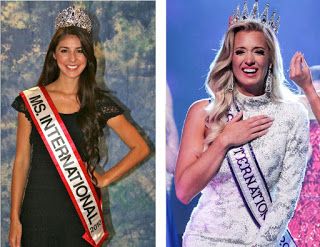The USPTO refused to register the mark MS. INTERNATIONAL for beauty pageant services featuring women "26 years of age and up" [INTERNATIONAL disclaimed], finding a likelihood of confusion with the registered mark MISS INTERNATIONAL for beauty pageant services featuring "single women" [two registrations, INTERNATIONAL disclaimed]. The Board found that the services overlap and presumably travel in the same trade channels to the same classes of consumers. But what about the marks? They are pretty close, aren't they? In re Ms. America Pageant, Serial No. 87820883 (February 22, 2021) [not precedential] (Opinion by Judge Christen M. English).

The Board first considered the strength of fame of the cited mark. The record evidence included:
- approximately 15 third-party use-based registrations incorporating the term "international" for beauty pageants wherein the term "international" has been disclaimed or the mark is registered on the Supplemental Register;
- approximately 10 third-party use-based registrations for marks incorporating both the terms "Miss" and "international" for beauty pageants wherein the term "international" has been disclaimed or the mark is registered on the Supplemental Register;
- more than 15 marks in use for beauty pageants incorporating the term "international"
- more than 60 marks in use for beauty pageants incorporating the terms "Miss" and "international"; and
- approximately 8 marks in use for beauty pageants incorporating the terms "Ms." and "international."
As to commercial strength, in addition to the registrations listed above, "the evidence shows that it is common for beauty pageant marks to comprise or incorporate a female courtesy title and the geographic indicator 'international.'" The Board therefore found that the mark MISS INTERNATIONAL is "conceptually and commercially very weak."
As to the marks, the Board found them to be similar in appearance and sound, but different in meaning and commercial impression:
This DuPont factor weighed slightly in favor a finding of likely confusion.
With regard to customer sophistication, the Board agreed with the Examining Attorney that contestants and advertisers will be "sophisticated" [i.e., discerning or careful - ed.] in choosing their pageants, "[b]ut not all of the general public spectating beauty pageants will have a familiarity with the beauty pageant industry or otherwise be sophisticated about beauty pageants."
Since the two pageants have been in operation for the past ten
years without any evidence of actual confusion, that factor weighed
"somewhat" in Applicant's favor.
Under the eleventh DuPont factor, Applicant established extensive and continuous use of its mark for ten years, but because "there is ubiquitous use and registration of marks for beauty pageants incorporating a female courtesy title and the term "International," including the third-party mark INTERNATIONAL MS, this factor is neutral or only slightly favors Applicant.
The Board concluded that "the extreme weakness of the cited mark and absence of actual confusion despite nearly ten years of 'extensive' and 'continuous' contemporaneous use are controlling here. It therefore found confusion not likely, and so it reversed the refusal to register.
Read comments and post your comment here.
Originally Published by Wolf Greenfield, February 2021
The content of this article is intended to provide a general guide to the subject matter. Specialist advice should be sought about your specific circumstances.
